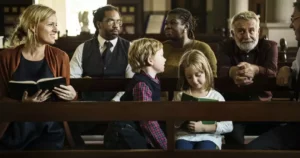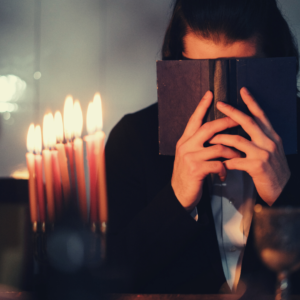I’ve always liked the construction “if anyone had told me XYZ when I was younger, I would have….” For example, if you had told my five-year-old self that some day I would not live in the same house as my parents, I would have cried. If you told me that I wouldn’t want to, I wouldn’t have believed you. If you told me in primary school I might one day be good at making friends, I would have scoffed. If you told me I would blow my last salary and undertake a PhD ten time zones away for a boy – all right, that one I may have believed. But I wouldn’t believe that I would do anything as wild as that for a relationship that wasn’t The One. But that’s what happened.
If you had told me I would be the person who writes on singleness and loneliness, I would have gone to serious measures to make sure that no one thought I was any good at it. It’s not the sort of thing I’d want to be known for. (And what if God thought I was so expert at talking about and encouraging people in their loneliness that changing my situation wasn’t worth the loss?)
When a few weeks ago my kind sister asked me to write on the subject for her mommy blog, for some reason (despite having done talks and workshops) this thought popped up: Oh. I’m the one who writes singleness blogs now.
But I don’t resent it (even though writing on how single you are is a sure way to bring on all the boys, amirite?). The reason is this.
Loneliness is a global pandemic. And in the life and times of COVID-19, I do not use that word lightly. It needs talking about.
Actually, the global lockdown makes loneliness (romantic or general) undeniable, so I don’t feel that I need to convince you that loneliness is a very common and very human affliction. Wesley Hill calls it “a deep incision on the surface of our existence”. The Psalms are full of lamentations of people who have felt alone, abandoned, and afflicted.
I had always been a lonely kid (one of very, very many I’m sure). We could go into the sob-stories of my life. I could mention a period of several consecutive years in which, with uncanny and almost hilarious predictability, my primary school bestie moved (either to a new school or Australia – apparently there was no in-between). I could talk about manipulative friendships, unrequited loves, toxic relationships, and a smattering of angsty are-we-even-doing-this ‘situationships’. Yet, I still had a loving family, would go on to make several life-long friendships, and was often surrounded by people. But I was still lonely. Achingly lonely. It was my first lesson in loneliness: sometimes it doesn’t matter your situation, you can still feel isolated. I started reading up on it. At first the how-to-relationship books. And then just loneliness in general. Romantic longing and unrequited love, a theology of singleness, identity. Loneliness itself as a human condition, even, in my Masters thesis.
One day, I came across some alarming statistics about singleness and loneliness in the church (Barry Danylak, Redeeming Singleness): the majority of adults, both within and without the church are single. That category includes the never-marrieds, the celibate, the divorced and the widowed. This is a large and un-ignorable group, yet the research showed that singles are under-represented in nearly every facet of church life. At the time I read this, I’d moved out to university and was for the first time in my life enjoying a church community of peers. For once, my friends weren’t all partnered off and having kids, but young, unattached people who had time and energy to do fun social things after 7pm. But the message I kept hearing preached was the wonderfulness of marriage, the importance of family, the care of spouses, the godly raising of children, the parametres of Christian dating. I became aware of a deep and unsettling discomfort that I wasn’t quite part of something, that I was considered incomplete. It was shocking but not surprising to learn that single people are more likely to volunteer their time anywhere else than at church. Only 15% of them are involved, in any significant way, in their church.
After that, the more I became aware of it, the more the church/single disconnect appeared to me to be a problem. I heard women on a podcast discussing how their conservative churches had not known how to deal with raising strong, godly single women, so many of them felt they’d been raised almost asexual until they finally married (at which point they were expected to easily flip the switch from asexual to tigress on the wedding night and didn’t know how). I noticed how the elderly felt self-conscious at events which were marketed as kid-friendly for families. I noticed my own self-consciousness in being hospitable to newcomers, not wanting to seem too forward, and also painfully aware of the inadequacies of my student rooms for socialising. I saw childless adults awkwardly excluded from family braais on the occasion of a child’s birthday, because their friends had only invited other couples with similar-aged children. The church, the beautiful love-filled church, is attempting to bring holiness and honour to marriage and family life, but is sometimes been guilty of going to the opposite extreme, turning virtue to vice. The love and emphasis of marriage and family can sometimes be at the expense of noticing and valuing a large percentage of their own family.
What was worse was that I saw squandered so many wonderful gifts in the single people I knew. Some girls capable of great affection were wasting it on very unworthy people because they could not find good community in the church. Some loners spent their time developing profound philosophies, deepening a well of wisdom on all aspects of life, that no one ever heard or asked for. Some newcomers from various minorities (or, at least, minorities for that church) came and went, feeling unwelcome, leaving the church unenriched by a different narrative. Some people stayed for years and years and years, clinging as desperate as limpets, and never feeling belonging.
Sisters, my point is that the church, if it is the functioning body of Christ, should not be a lonely place. And yet hundreds of thousands of people, particularly singles, are reporting that to be the case. The church should be a place people come and find community, not a club for communities already-formed. If these are the numbers, we have a lot more work to do in honouring singleness by recognising it as a state of being (not just a waiting room for partnership or death), and being aware and conversant in those struggles as well.
At about this point, I’m sure you are wondering what this kind of post is doing here. In fact, I can guess what you’re thinking: Oh no. Please not another demand on my time, my limited resources, my compassion. Compassion fatigue is a real thing, and something that seems to me to be common in the mommy blog community. Your own life is making such demands on you at the moment, that it’s so hard sometimes to think beyond them. The global community has never felt closer because everyone has access to international stories, email chains, Whatsapp groups. That means everyone knows someone who is hurting or in need. We are current with global movements that are as emotionally difficult to engage with as they are important. To say nothing of the people in our immediate circles, our family, who have a right to that kind of attention. As followers of Christ, we believe that our call is to be salt and light to the earth, and to build His kingdom here. We also believe that as His body we can be the hands that hold, the hearts that give, the shoulders to help bear the burdens. But where do we even begin?
Do not despair! If we end the story there, with need and not solution, we sell the gospel short. After all, that is what salvation is. It’s recognition of great need, and solution. The fallenness of this world is a fact we can and should feel on a universal and a personal level. “In this world you will have tribulation.” But to that Jesus says, “take heart; I have overcome the world.” (See John 16:33.)
Let me paint you a picture. When I lived in my teeny-tiny little student place (where if I wanted to have a guest over for tea, I would have to wash out my handle-less pencil mug and sit on the bed so that they could have my only mug and the desk chair), I would have been grateful even to be asked over to a chaotic dinner with noisy toddlers and tired parents. Some of you think this does not count for hospitality but I’m telling you that sometimes (and don’t exploit this, haha) I would have been glad to wash the dishes and do the evening chores with a mommy friend just to have the company, to be part of something.
What a glorious thing for the church when every member, regardless of experience, is treated as an equal. Let me be clear: I’m not calling for pity. As John Piper said, “The greatest, wisest, most fully human person who has ever lived never married—Jesus Christ.” What’s good enough for Jesus shouldn’t be treated as subhuman for someone else, even if their loneliness is a burden. If we believe in a God who is both sovereign and good, let’s stop treating it as God’s plan B.
I know single people who are renowned and praised for the wisdom (and humility) of their parenting and relationship counsel. Many have taught me so much about reflection and rest, and (especially pertinent for a career in the Arts) engaging with a culture that has an increasingly hostile outlook on Christianity. That can only happen when you treat singles as persons whose experiences are worthy of your attention, even if they are not in your situation. Without their insight, the church is a poorer place and out of touch with a society who aren’t consumed with the nuclear family. Without their presence in churches, the body of believers becomes an echo chamber. Moms, while I know it is helpful to be in community with other moms who can support you in your struggle, let us not neglect the input, the insight, and the struggle of those who are not like us. Proverbs 27:17 says “As iron sharpens iron, so one person sharpens another” and we’ve seen from Danielle’s post how important (though difficult) it is to hear from those who are different from us. To our benefit, it stops ‘my experience’ from being the centre of the universe.
Yet, even as I say that single people have a wealth of good to offer you in a relationship, it’s worth noting that you also have a lot to offer them. On a very basic level, inclusion. For single people, as Wesley Hill points out, most of their relationships are not permanent: they are no one’s priority and people are often moving on without them. It’s a hard truth but a loud call to action. Imagine the powerful message you can send to the world and the church when you show someone care. For me, what was even more important and beautiful was seeing the beauty of respectful and loving relationships between people who shared the same faith – not only shared, but who championed the faith of their spouse. This, more than anything I’ve ever read or been taught, has influenced my dating life for the best. I can never be satisfied now with someone who only ‘tolerates’ my deep devotion to God. I am hungry for someone who champions it.
Before I had my own gorgeous godchildren and nieces to gush over and spoil, it was my joy to develop deep and lasting relationships with the children in my church, and my privilege to have other older people in my life play that same role for me. When it’s functioning properly, the church is a happy family full of aunties and uncles and cousins who have no blood relation to you whatsoever. In non-Christian and non-South African circles, you can’t explain how someone is your “auntie” without also proclaiming the glorious love of God’s people in the church.
What a message of hope for a lonely world!
During lockdown, a friend asked me how I was doing. “Oh, you know, struggling a bit,” I answered, trying not to be too honest about how hard I was finding it all. “But then again, I’ve always been a lonely person.” I saw the thin streak of panic come over his face, the “oh no, we’re going to have that conversation” face, and I thought, It doesn’t have to be this way. Why do we feel the need to hide loneliness? I think it may have something to do with admitting we’re vulnerable and risking that others might not care. But the thing is that we’re vulnerable whether or not we admit to loneliness. Hearing someone confess their loneliness need not be heard as a black hole of need, but as an invitation. In a self-sufficient culture, this is one of the most beautiful ways the church is called to be counter cultural. “By this all everyone will know that you are my disciples, if you love one another” (John 13:35, my emphasis).
So, mother/wife/loner/friend/sister/butcher/baker/candle-stick-maker, ask yourself: what is my ministry? First of all, make sure that you are involved. God has redeemed you for good works and for his glory (Ephesians 2:10). You are part of the body now. Is your thing meaningful conversations in your workplace? Are you an encourager of other believers, or a comforter, or a mentor? Maybe you’re really good at noticing other people and bringing them in and connecting them to the church family. Maybe your passion for reading makes you a knowledgeable debater in Bible studies. Maybe you can only bake really ordinary biscuits (but people really feel special when you’ve thought of them and sent one round). Sometimes all someone needs is a chat over a cup of coffee served in a handle-less pencil mug. Whatever it is, you’re part of the body. That means you need to reach out to those who are marginalised, and those who are hurting, to those who are lonely, or who need a friend. Build into their lives and let them build into yours, especially if you are different. Value others, no matter where they’re coming from. And you include them in your life, because they are part of the body too. This may mean you will need to make more of an effort than perhaps is comfortable, to integrate or to host yourself, but what beautiful things are formed from brief moments of discomfort.

Amy is writer, reader, PHD researcher, and long-distance auntie temporarily based in Wellington, New Zealand. Somehow, she has convinced her university that writing a thesis on Tolkien and C.S. Lewis is a valuable use of her time and their resources (so mostly useless to professional recruiters for actual adult jobs). She approves of the wisdom in pixelating the faces of her two beautiful nieces on this blog, but thinks you are all missing out on the two cutest things in the world. Apparently, she is the singleness guru now. (Jesus take the wheel.)
Photo Credit: Polina
Tags: body of Christ, church, gifts, loneliness, lonely, love, man, marriage, men, single, singleness, socialise, woman, women






Leave a Reply